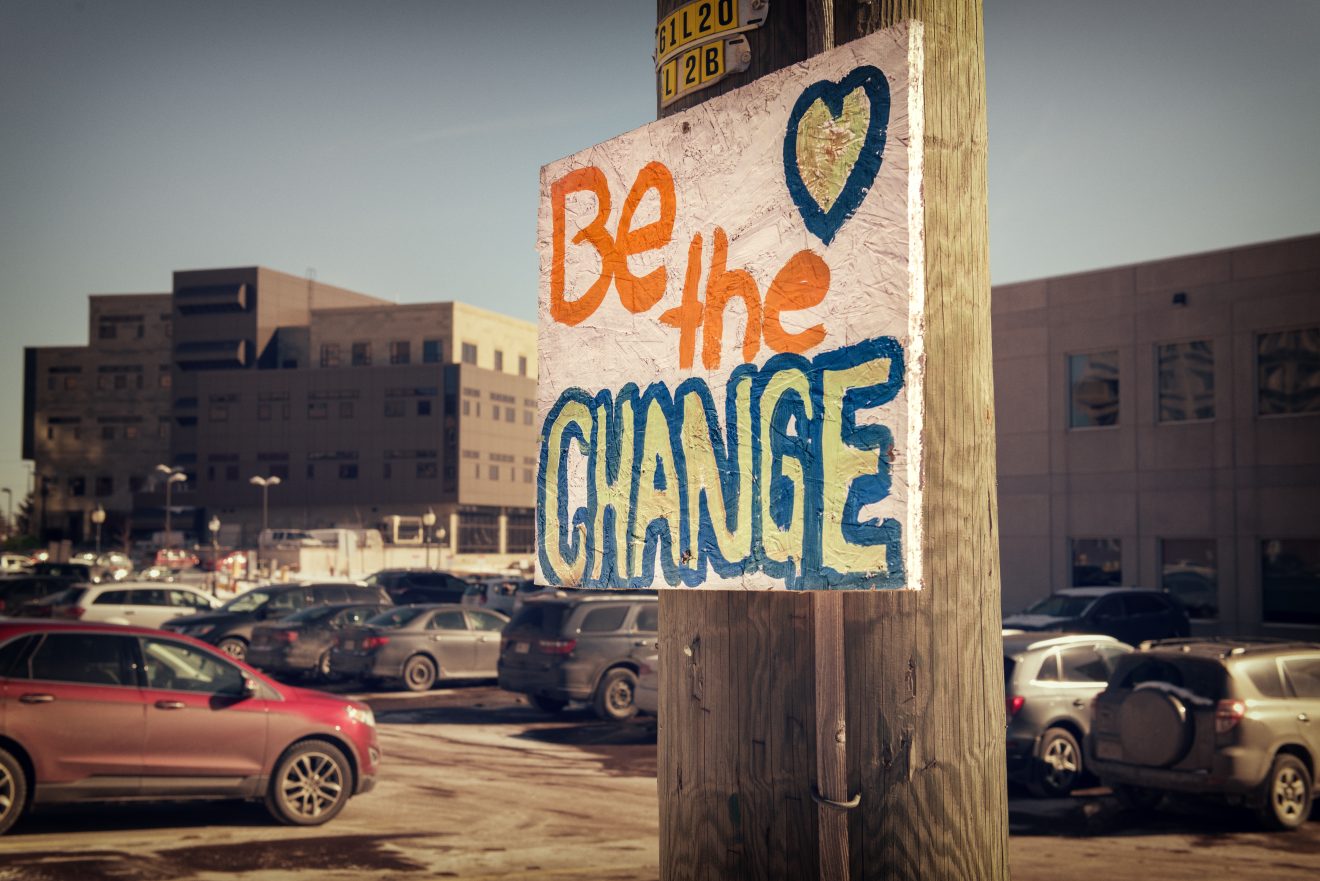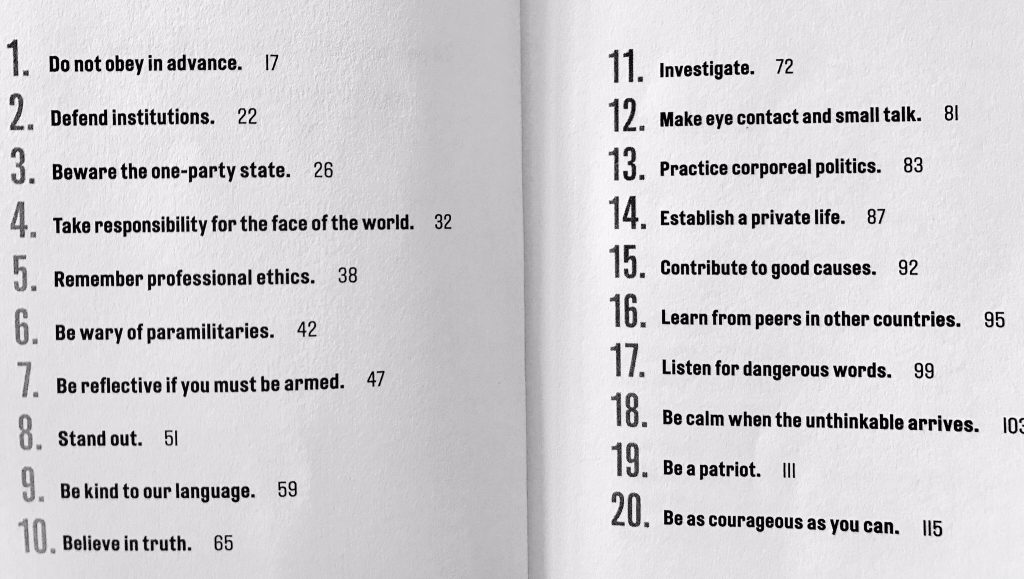|
|
|

|
Welcome to Week 82 of Be the Change
There are no easy words of comfort or bromides to make what America just did acceptable or anything other than tragic, despicable, and terrifying. So this week I share a long and, I hope, thoughtful essay about where we go from here, along with poetry. We need a lot of poetry now. So much poetry.
|
|
|
|
|
|

|
|
|
“There is only one thing I will not concede: that it might be meaningless to strive in a good cause.” - Václav Havel
|
America just re-elected a fascist to the highest office in the land. If you disagree with the mountain of evidence backing up that assertion, this essay is not for you. If you merely prefer a term other than "fascist" to describe Trump's firehose of lies, bigotry, misogyny, corruption, incitement to violence, and lawlessness, read on. This essay is for those who see in Trump's victory a complete rejection of all that gives us hope for a prosperous future and who wish, above all, to chart a path forward.
|
There will be much ink spilled over why Trump won. Bernie Sanders says it "should come as no great surprise that a Democratic Party which has abandoned working class people would find that the working class has abandoned them." Nancy Pelosi blames Biden's "late exit" from the race and the lack of an "open Democratic primary." Others say it was a global anti-incumbency bias; inflation and the economy; our lack of an equivalent to the right-wing media ecosystem (e.g., we have no liberal Joe Rogan); that is was Gaza; or that we went too fast or too slow on climate, racial-justice, etc.
|
These explanations are, to varying degrees, probable, even persuasive. But to the extent that they point to valid factors, they fail to identify structural causes and, as a result, propose the wrong solutions. For if we think we have a messaging problem, we invest in messaging; if we think our problem is embracing the working class, we can try to embrace the working class. The underlying issue, however, is that we have come to believe that there's a technical solution to our problems, one that can ignore human beings and all their insecurities, biases, motivations, and vulnerabilities.
|
What I mean by technical is not just technological but that which is scientific, practical, and rational. For in much the same way that the economic view of humans as "homo economicus" leads to policies wildly out of step with how human beings actually make decisions, the notion that voters are rational and informed as opposed to emotional and often uninformed is bound to fail more often than succeed. This is particularly true when the Republican political project has, since the Nixon era, largely centered around a call to the fears and biases of voters: we will never out-Republican our way to victory.
|
To illustrate my thesis, consider solar energy. Thanks to American scientific innovation, Chinese mastery of manufacturing, and policy supports, solar has become ludicrously cheap and is proliferating around the world at the rate of over a gigawatt a day (that's the size of a typical nuclear reactor). The problem is that even as the adoption of solar, wind, battery-storage, electric vehicles, heat pumps, and other clean technology accelerates, greenhouse gas emissions continue to rise. In the U.S., for instance, at the same time that we set records for deployment of solar, we also set records for oil and gas production. It should go without saying that this paradigm will not result in the achievement of our global climate goals.
|
We have forgotten that solar and good policy to support it does no good if human beings oppose the construction of solar farms, or don't opt to install solar on their homes and businesses, or vote for politicians that consider solar a threat to fossil-fuel interests, or believe that climate change is a hoax. And because we have focused on technical solutions, we have been deluded into thinking that we can tackle the climate crisis without telling ourselves and our constituencies hard truths. This leads us to message clean energy in a way that resonates with different demographics: focus on energy security here, pollution reduction there, cost savings here, climate-change there. And from the vantage point of each transaction--a salesperson selling solar to a homeowner--that makes sense.
|
But from the perspective of the nation, treating solar as a product to be sold instead of a tool to address a planetary emergency simply doesn't work. We must message clean energy in a way that resonates, not just at the household level, but at the level of our shared values: no matter how disastrous the election results and what it portends, families still want opportunity and hope for themselves and their families. It is time, then, for us to be honest. We need to adopt solar--and affordable health care, good-paying jobs, affordable housing, public transit, broader protections for civil rights, and other core Democratic planks--not simply because they have benefits to participants in a transaction, but because they are aligned with American values and aspirations and are popular with the electorate.
|
How can we eliminate fossil fuels as fast as possible when the story we tell is that clean energy is always cheaper and better? If we don't ground our work in the need to tackle the climate crisis, we end up treating each other as children. We say that you can "do well and do good"--that is, become fabulously rich and be a force for good (Elon Musk alone ought to disprove that notion). That going green entails no sacrifice and indeed that nothing--not supporting Ukraine, not ending homelessness or hunger or poverty--should impinge on the voter's time, energy, or money. That we can be a vibrant democracy merely by wandering into a booth once every four years, barely aware of the candidates and having not engaged in our democratic process over the preceding years. Imagine if during World War II we had, instead of asking Americans to plant Victory Gardens and purchase Victory Bonds, said that unless you were in the military, your life wouldn't change. We would have been incapable of defeating Hitler.
|
Until November 6th, 2024, I too thought that we could simply deploy clean energy as fast as possible and outrun the fossil fuel lobby and GHG emissions. I figured we were in a climate crisis and while it would be nice to have lengthy conversations with voters about the greenhouse gas effect, it would be faster to do an end-run around all that and just get "glass on roof," as we say in the industry. I should have known better. In August 2022, President Biden signed into law a piece of climate legislation that is absolutely transformational--for workers, for community groups, for families, for national security and competitiveness, and for the planet. Yet because we neither tell nor want to hear the truth--and, in this case, because of Senator Manchin--we named the bill the Inflation Reduction Act, as though climate action would of course reduce inflation and of course do nothing but save people money.
|
As we know, inflation didn't come down, or at least not fast enough to make the electorate happy. And since Republicans are shameless and Democrats are susceptible to shaming, we ran away from the issue entirely: it's easy to say "Because of Democrats, the price of eggs is up 10%" and hard to persuade with, "Because of our policies, the U.S. has one of the lowest rates of inflation in the world" As a result of this reticence and a right-wing media ecosystem that dominates the conversation, 60% of voters knew nothing about the bill, even though its contents--incentives for U.S. manufacturing and good-paying jobs, capping the price of insulin, emissions reductions--are wildly popular.
|
We cannot get people to vote for us if they don't know what we've done, and why we've done it. If we refuse to engage on the reality of the climate crisis, or the reality of racial and gender injustice, then our solutions are going to seem elite and out-of-touch: What do carbon emissions have to do with my pocketbook, or the racial-wealth gap with my child's future? Making that case is hard. Indeed, I'm not sure it's possible to get past their media ecosystem with ideas that can't be conveyed in a sound-bite. Anything we say will be spun by bad people toward ill ends. But we have to make the case and to do it in every format possible. After all, working families are the ones most hurt by pollution and natural disasters. Racism and sexism hurt all of us.
|
Arguing that the way to fight American fascism is treating Americans like adults and telling the truth does not elide the challenge of doing so. Nor does it provide an excuse for disengaging from the media platforms--social media, podcasts, YouTube video, newspapers, radio shows--that seem to influence the electorate more than factual news and reasoned analysis. Rather, the argument asks that we engage in a different way. Again, we cannot out-Republican Republicans: replacing their lies and false promises with bromides and half truths won't sway their voters and will turn off ours. The challenge before us is to turn the tide on American politics, from shallow discourse and easy answers to deep discourse and honest discussion. That is a tall order for any nation in any time period; it may be an impossible one in America in the age of rampant propaganda and disinformation.
|
As we contemplate the carnival of despicability that is about to take the levers of power in Washington, we neither have the time to radically transform American politics, nor the luxury not to try. The voters delivered a crushing blow to the cause of peace and justice, and there are no easy answers. The longer we grasp for easy answers, the more we'll prolong the power of the fascists. Below are some things I encourage us to keep in mind:
|
- It is only by leaning into, repeating, reinforcing, believing in, and sticking with the truth that we can survive, resist, and overcome malignant lies. One such truth is that, as Tom Nichols wrote in The Atlantic, "a majority of American voters chose Trump because they wanted what he was selling: a nonstop reality show of rage and resentment." Let us not make excuses for the inexcusable. Sure, some voters were hurting economically or felt unheard. But unless they had been living under a rock for the past 8 years, they had at least some sense of the kind of man they were supporting.
- We will never beat bad-faith actors at their game. The Democratic base is too diverse and, in general, too educated to be inspired by the Steve Bannon approach of "flooding the zone"--even if we try to flood it with positive messaging instead of shit. And yet we have to reach voters: a stunning percentage of them didn't know that Biden had dropped out; that it was Trump, not Biden, that drove the overturning of Roe vs Wade; that unemployment is at a historic low, and so on. The key question is whether we can find a way to speak to the complex challenges that face us, the forces that divide us, through TikTok videos, YouTube ads, and podcasts, in addition to grassroots organizing and other forms of deeper engagement.
- The attention economy is incompatible with vibrant democracy. Deep discourse cannot happen on social media, nor can deep learning take place on TikTok or via WhatsApp threads. The best thing we can do to rebuild America is to put down our phones and pick up a book, step away from our desks and take a walk, and then to re-engage with one another: at church, the community center, or library, through volunteerism and sports, etc. 54% of Americans read below a sixth-grade level and hardly any of us do more than read a headline or Tweet. These are generational and civilizational problems that we cannot solve in time for the 2026 midterm elections. What we can do, starting tomorrow, is to internalize these truths and allow them to inform our actions. This means, for example, that rather than shouting at one another online we should step back and read Václav Havel's the Power of the Powerless, Timothy Snyder's On Tyranny and On Freedom, Martin Luther King's Letter from a Birmingham Jail, Saul Alinsky's Rules for Radicals, Masha Gessen's Surviving Autocracy, Thoreau's Walden, and Carolyn Forché's What you Have Heard Is True: A Memoir of Witness and Resistance and In the Lateness of the World: Poems. And we should encourage our children to spend less time on their devices and more time playing, reading, thinking. I guarantee we will find more inspiration for what to do moving forward in these books and poems than we will on Reddit.
- All this is not to say that we have to be saints who occupy the moral high ground. Quite the contrary. I am sick of being asked to accept defeat graciously and magnanimously when in 2020 the Republican response was to lie, throw an insurrection, and never concede defeat. Saul Alinsky had a lot to say about people who try to take the high road. In his book Rules for Radicals: A Pragmatic Primer for Realistic Radicals, he wrote, "The means-and-ends moralists, constantly obsessed with the ethics of the means used by the Have-Nots against the Haves, should search themselves as to their real political position...Their fears of action drive them to refuge in an ethics so divorced from the politics of life that it can apply only to angels, not to men. The standards of judgment must be rooted in the whys and wherefores of life as it is lived, the world as it is, not our wished-for fantasy of the world as it should be."
|

|
"20 Lessons from the 20th Century on How to Survive in Trump’s America." - Timothy Snyder
|
Our task is to fight tooth and nail for the future we want while recognizing that we can't do so without engaging and convincing the people who just voted against that future. Our task is inherently more difficult. As Havel wrote, "It is a natural disadvantage of democracy that it ties the hands of those who wish it well, and opens unlimited possibilities for those who do not take it seriously." Over the coming months and years, the fascists will try to overwhelm us, deflate us, terrorize and divide us. It is simply not an option to give in to them. Feel sad, feel overwhelmed, feel angry, dejected, depressed, and motivated. We are adults and adults can hold conflicting feelings in their hearts without falling apart entirely. Many of us are parents and as parents we know how to set aside our own insecurities in service of protecting and fighting for our children. Whatever your personal reason for moving forward--faith, family, poetry, love of nature, love of humanity--lean into it, work in solidarity with others, and do your best to move forward. Live a moral life. Teach your children well. Be honest and true to yourself, and unwavering in your belief in what's right. Havel also wrote that “Hope is definitely not the same thing as optimism. It is not the conviction that something will turn out well, but the certainty that something makes sense, regardless of how it turns out.” Working for justice and a better future makes sense. Full stop.
|
Finally, I share a few poems of mine that will hopefully provide some comfort and inspiration:
|
Don’t Let the Fascists Win
|
To write is to argue without evidence that beauty
pervades: the rainforest and the killing field,
sunsets and floods of acid rain on I-95.
|
Every morning I brush my teeth, wash my hair,
check my clothes in the mirror before work.
Is it vain or naïve to read poetry these days?
|
I’ve travelled millennia across lands of brute
illiteracy and great odds to arrive here, on a
couch in the suburbs of a fragile Democracy:
|
Isn’t it nice to rest a while, put our feet up, drink
of the marvels of a global economy?— My coffee
is from Perú, my coffee-maker made in China!
|
The TV blares, though I’m not watching; every
so often I hear a commercial for car insurance.
I forgot to turn off the upstairs-light; my empty bed
|
is bathed in unobserved miracles. Passing comets must
marvel that so much abundance can go to waste.
In America it is naïve to be an idealist,
|
and yet we’ve built a union worth perfecting.
On Monday mornings, I cringe at myself in the mirror,
then hurry along I-95…
|
so much work to do today.
|
“And I should like to be able to love my country and still love justice. I don’t want any greatness for it, particularly a greatness born of blood and falsehood. I want to keep it alive by keeping justice alive.” – Albert Camus
|
When children by gunfire die,
When the dreamer and the warden clash,
|
When statues betray the sculptor, we proclaim
This is not who we are.
|
I take my chisel to Plymouth Rock
But the rock gives no blood;
|
Our history is like that stone,
Heavier than its weight…
|
Standing at a dank underpass, I rattle
A tin cup, wave a sign that reads
|
I can grow rich here, devote my life
To the pursuit of happiness…
|
It is said that upon his murder, Lincoln belonged
To the ages: Why do we wait for blood?
|
We’ve planted great forests of headstones.
I wander their lush paths, the sanguine streams,
|
And amidst this grandeur, this horror,
I glimpse both what is and what could be.
|
Election Day: When My Blood Is on the Ballot
|
“Power is not what you have but what the enemy thinks you have.” —Saul Alinsky
|
Elections have consequences.
So say the victors to justify
their ends and means.
|
Perhaps the American Dream
is to live without consequence:
no mistakes, only cheapness
|
we are free to later discard.
Why deliberate honestly?
Abundance is our temptation,
|
prosperity the lie we tell to
expiate our original sin.
Elections have consequences.
|
Had Lincoln lost, how many
would we still count as slaves?
|
Who voted for mass incarceration,
child detention, soaring inequality?
|
In America anything is possible.
A Black president. Rags-to-riches.
Our poets, scientists, entrepreneurs
|
have proven their greatness—
the full flower of individualism—
yet something blights the soil.
|
We are good people but not a
Good People. We welcome the Iraqi
refugee, ignore the crime that made him one.
|
Who voted for the War on Terror?
Who paid for the lies that launched it?
|
How much is too much to spend on
defense? On political ads?
|
Alinsky argued that what matters
is a particular means for a particular
end. Democracy not in the abstract
|
but in the flesh, the messy world
of action and reaction. I’m ready to commit
murder at the ballot box. I hope it’s not
|
too late to stop the carnage. America
forgives itself so easily, as though
we weren’t forgiving but forgetting.
|
If we knew the difference between
poll numbers and corpses, budgets
and starvation, we might have avoided
|
this moment. A pandemic. A fraud.
I cast my vote uncertain it will count.
That is, be counted. That is, matter.
|
When my blood is on the ballot,
there is only one outcome I can accept.
Elections have consequences.
|
|
|
|
|
|
|
|

|
|
|
I dreamt I was a kelp forest swaying in pitch-
-black waters. Above me moonlight fluttered
|
like confetti and seagulls roosted on cliff-sides
and buoys. An oil tanker drifted by, the workers
|
playing cards and smoking cigarettes as though
they hadn’t a thing to fear on Earth, for in this
|
world everything was in its place, schools of
Mackerel in the sea, lighthouses promising
|
safety in the darkness, tides brushing
beaches, rivers sanding rocks, and everywhere
|
good people sleeping safely in their beds.
If you’ve ever chanced upon a peaceful dream
|
and stayed asleep despite knowing it’s unreal
and tragedy is the blanket keeping you warm,
|
then you understand what it is to be awoken
by a pair of rough hands around your neck and
|
a hungry mob setting fire to the ripe fields,
spitting gibberish about the price of eggs.
|
|
|
|
|
|
|
|
The coming years will be hard. All is not lost. We will continue to believe in and work for a better tomorrow.
|
|
|
|
|
|
|